 |
| Libby Dean is a Master's student in Environmental Studies.  (Abriel photo) |
Dalhousie├Ľs broad, collaborative approach to environmental questions is the right model for grappling with the world├Ľs ecological and health crises, says a foremost expert in epidemiology.
├ĺI am so encouraged by what I├Ľve seen here today,ÔÇŁ said Dr. John Last, keynote speaker at Dalhousie├Ľs third annual Environmental Health Symposium. ├ĺWe all need to understand and grasp complex concepts, to connect everyday life and our own activities to the larger problems.ÔÇŁ┬á
Hosted by the Elizabeth May Chair in Sustainability and Environmental Health, the November 8 conference drew more than 260 visitors. Events included green walking tours of the campus, the opening of a new geomatics lab, and a poster exhibition showcasing work by more than 60 researchers from across the Maritimes and as far away as McMaster University.
An expert in the links between ecosystem health and human health, Dr. Last is emeritus professor of epidemiology at the University of Ottawa. A prolific author, editor and health policy advisor, he has been involved in such publications as the Encyclopedia of Public Health and the Oxford Illustrated Companion to Medicine.
 |
| Catherine Boyd was a presenter at the poster exhibition. (Abriel photo) |
Apologizing in advance for his ├ĺcatalogue of disaster,ÔÇŁ he discussed current and future health impacts of pollution, climate change, poor water quality, loss of fisheries and other natural resources, and other human-induced environmental disruption.
├ĺDegradation of essential life support ecosystems will rapidly accelerate in the next 50 years,ÔÇŁ he said, adding ├ĺthis will be a massive public health problem.ÔÇŁ
Millions of people will lose their habitats even by the end of this decade, while rising temperatures and sea levels will help the spread of disease, famine and poverty. Societies must start acknowledging the connections between the environment and human health, and the best solutions will come from a collective approach among scientists, health care workers, governments, industries, citizens├Ľ groups and more, he said.
├ĺAs an academic, you can get stuck in a little bubble sometimes,ÔÇŁ agreed Libby Dean, a Master of Environmental Studies student who participated in the symposium├Ľs poster display. ├ĺYou need some interaction with the outside world to see, ├öwhere does this go from here?├ĽÔÇŁ
Dal├Ľs annual symposium is a great opportunity for faculty, students and researchers in many fields to share their ideas and insights while finding common ground, said Dean. Her research examines how best to communicate with Inuit mothers in Labrador about health risks from environmental contaminants in the air, water and food chain. Her project earned top awards at the XIV International Society for Human Ecology Conference in Maine, and the Canadian Aboriginal Science and Technology Society conference in Cape Breton.
The poster exhibition reflected many disciplines, from biology to civil engineering. Projects ranged from the impact of climate change on Atlantic forests to the role of biomass energy in reducing our dependence on fossil fuels, and using vegetable oils in the treatment of textile plant wastewater.   
For more details about the Elizabeth May Chair, visit .
║┌┴¤│ď╣¤═°is a world leader in ocean research. Read about our contributions to groundbreaking new knowledge about the loss of fisheries and other natural resources here: Losing species
